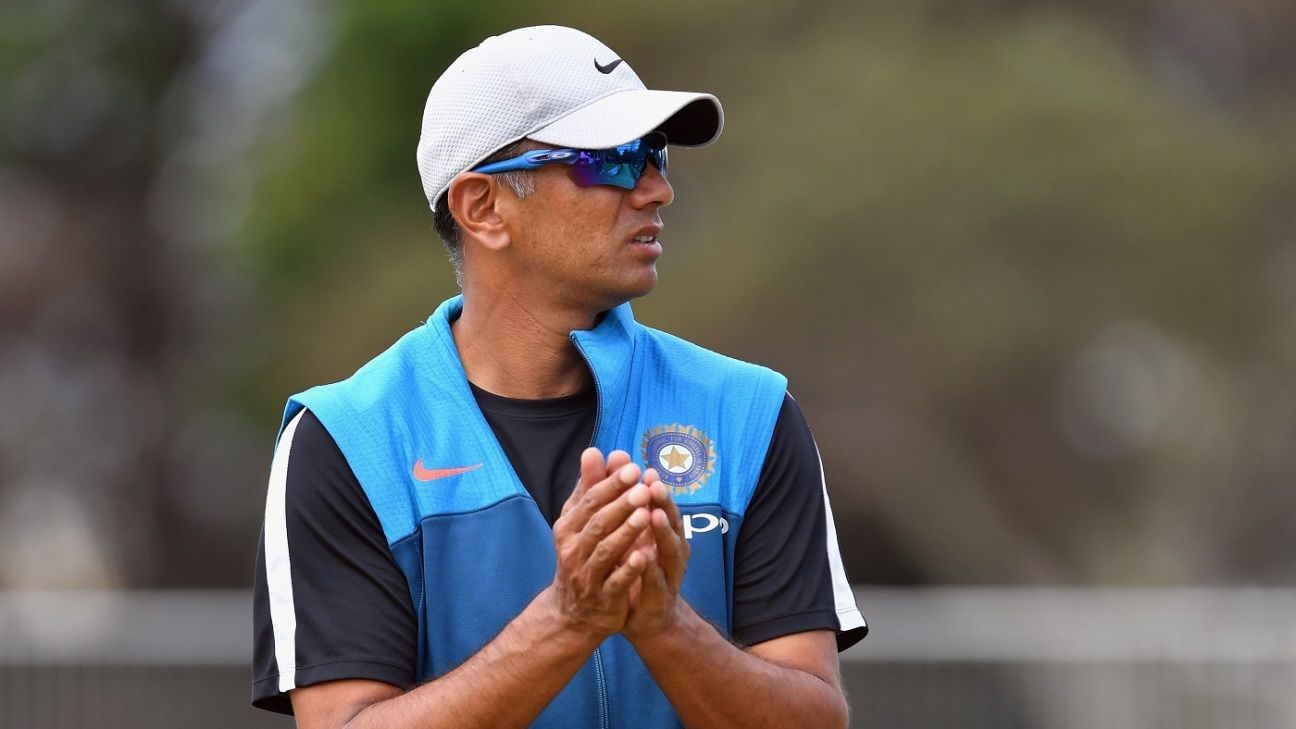
Rahul Dravid believes that the IPL is ripe for expansion to nine teams in the near future, in order to provide an extra outlet for the surge of young Indian talent that the competition has helped to unleash since its inception in 2008.
Dravid, who currently heads the National Cricket Academy, helped to mentor a clutch of this year's IPL debutants - including Rajasthan Royals' Yashasvi Jaiswal and Kartik Tyagi, and Kings' XI Ravi Bishnoi - when he took charge of India's run to the final of the Under-19 World Cup in New Zealand earlier this year.
And while he is adamant that the overall standard of India's white-ball cricket has never been higher, he's sure there's room for even more young players to be given the chance to learn from the best on the IPL stage - as shown by the sustained success of Mumbai Indians, whose unrivalled blend of youth and experience has propelled them to five titles in the past eight seasons.
"Purely from a talent perspective, I think we're ready for an expansion," Dravid said during a Rajasthan Royals book launch. "It's been fantastic to see so many of those young Under-19 boys come on and establish themselves, not only for their state teams but also in the IPL. But many more are actually not getting opportunities. They are sitting outside in a lot of these teams, because the quality of the cricket is so good and there are so many good and experienced players.
"This is why Mumbai Indians have been so good," he added. "What they've done really well over the last four or five years is to maintain a strong core of really high-quality players and mix that up with some really good young talents.
"They were able to spot Jasprit Bumrah and Hardik Pandya at a young age, they've brought in Rahul Chahar and backed Ishan Kishan, and while you wouldn't exactly call Suryakumar Yadav a young player because he's been around for a while, a large part of their success is down to a very good scouting structure."
On a national level, Dravid believes that India's pathways for junior cricketers have been exponentially improved by the IPL effect, with the trickle-down effect of the tournament's huge cash injections leading to improved facilities at grassroots level, and heightened incentives and opportunities for young players to commit to a financial future in the game.
"India does have a very strong junior system, but it's not easy to give them these experiences just in a domestic competition. The IPL gives these talents the opportunity to express them on the world stage" Rahul Dravid
"Now the IPL is not only about the top level," Dravid said. "In the past in Indian cricket, when young players were looking for opportunities, the only place they got them from was from the state associations. They needed to play for their Ranji Trophy team in their own state, but today because of the IPL, you can be from Karnataka and you can play for Mumbai."
Dravid cited the breakthrough season enjoyed by Royals' Rahul Tewatia as proof of how the IPL's onset has transformed the opportunities for the country's up-and-coming players. As a young spinner at Haryana, Tewatia was behind the likes of Yuzvendra Chahal, Amit Mishra and Jayant Yadav in the state pecking order, and played just seven Ranji Trophy games in as many seasons. He became one of this season's cult figures after his remarkable match-winning feat against the Kings XI Punjab in Sharjah.
"In the past, [Tewatia] would not have been able to show his talent because there wouldn't have a stage to do it," Dravid said. "But that's the other great positive of the IPL. You have eight franchises looking out for the best players, so it's like having eight extra pairs of eyes watching out for talent all over the country, which is exactly why you're seeing so many of these young players come through.
"It's already opened the floodgates for people from small towns and cities who watch the IPL on television," he added. "Coaching is not a barrier to anyone because you get to listen to the best experts on television, and because of the money of the IPL, there are facilities in small towns in India which you would not have heard of a decade ago.
"India does have a very strong junior system, but it's not easy to give them these experiences just in a domestic competition. The IPL gives these talents the opportunity to express them on the world stage. As much as we can do as coaches to help them in their journeys, the opportunity to bat with Virat Kohli and to learn from AB de Villiers is priceless, and will help them grow as cricket players and as people as well.
"It's no coincidence that, if you look at India's white-ball cricket since the IPL started in 2008, we've won one World Cup, we've been in the semi-finals of two others. We won a Champions Trophy, we've been in the semi-finals of the T20 World Cups. In the last decade, India's white-ball cricket has been the best ever in our history, and a lot of that is because of the experiences these young players are getting."















 Phone: (800) 737. 6040
Phone: (800) 737. 6040 Fax: (800) 825 5558
Fax: (800) 825 5558 Website:
Website:  Email:
Email: 






